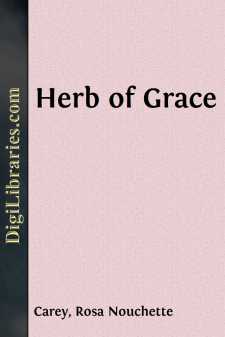Literary Collections
- American 84
- Ancient, Classical & Medieval 14
- Asian 1
- Australian & Oceanian 1
- Canadian 55
- Continental European 121
- English, Irish, Scottish, Welsh 179
- Essays 160
- General 24
- Letters 46
- Middle Eastern 1
Literary Collections Books
Sort by:
by:
William Carleton
CHAPTER I. Short and Preliminary. In a certain part of Ireland, inside the borders of the county of Waterford, lived two respectable families, named Lindsay and Goodwin, the former being of Scotch descent. Their respective residences were not more than three miles distant; and the intimacy that subsisted between them was founded, for many years, upon mutual good-will and esteem, with two exceptions...
more...
Last spring I found a pumpkin seed, And thought that I would goAnd plant it in a secret place, That no one else would know,And watch all summer long to see It grow, and grow, and grow,And maybe raise a pumpkin for A Jack-a-lantern show. I stuck a stick beside the seed, And thought that I should shoutOne morning when I stooped and saw The greenest little sprout!I used to carry water...
more...
DEDICATION. MY DEAR WILLIAM ARCHER, Severe and ruthlessly honest man that you are, you will find that the levities and the gravities of this book do not accord, and will say so. I plead only that they were written at intervals, and in part for recreation, during years in which their author has striven to maintain a cheerful mind while a popular philosophy which he believed to be cheap took possession...
more...
INTRODUCTION. Mary Wollstonecraft was born on the 27th of April, 1759. Her father—a quick-tempered and unsettled man, capable of beating wife, or child, or dog—was the son of a manufacturer who made money in Spitalfields, when Spitalfields was prosperous. Her mother was a rigorous Irishwoman, of the Dixons of Ballyshannon. Edward John Wollstonecraft—of whose children, besides Mary, the...
more...
by:
Amelie Rives
A BROTHER TO DRAGONS. I. In the year of grace, 1586, on the last day of the month of May, to all who may chance to read this narrative, these: I will first be at the pains of stating that had it not been for Marian I had never indited these or any other papers, true or false. Secondly, that the facts herein set down be true facts; none the less true that they are strange. I will furthermore explain...
more...
by:
Marie Corelli
CHAPTER I A cloud floated slowly above the mountain peak. Vast, fleecy and white as the crested foam of a sea-wave, it sailed through the sky with a divine air of majesty, seeming almost to express a consciousness of its own grandeur. Over a spacious tract of Southern California it extended its snowy canopy, moving from the distant Pacific Ocean across the heights of the Sierra Madre, now and then...
more...
by:
Jack London
WHEN GOD LAUGHS (with compliments to Harry Cowell) "The gods, the gods are stronger; timeFalls down before them, all men's kneesBow, all men's prayers and sorrows climbLike incense toward them; yea, for theseAre gods, Felise." Carquinez had relaxed finally. He stole a glance at the rattling windows, looked upward at the beamed roof, and listened for a moment to the savage roar of the...
more...
CHAPTER I Our adventures hover round us like bees round the hive when preparing to swarm.—MAETERLINCK. From boyhood Malcolm Herrick had been a lover of the picturesque. In secret he prided himself on possessing the artistic faculty, and yet, except in the nursery, he had never drawn a line, or later on spoilt canvas and daubed himself in oils under the idea that he was an embryo Millais or Turner....
more...
by:
Andrew Lang
CHAPTER I AN ISLAND LANDFALL For nearly ten years my health had been declining; and for some while before I set forth upon my voyage, I believed I was come to the afterpiece of life, and had only the nurse and undertaker to expect. It was suggested that I should try the South Seas; and I was not unwilling to visit like a ghost, and be carried like a bale, among scenes that had attracted me in youth and...
more...
by:
William Carleton
GOING TO MAYNOOTH. Young Denis O'Shaughnessy was old Denis's son; and old Denis, like many great men before him, was the son of his father and mother in particular, and a long line of respectable ancestors in general. He was, moreover, a great historian, a perplexing controversialist, deeply read in Dr. Gallagher and Pastorini, and equally profound in the history of Harry the Eighth, and...
more...











